These days, you are able to see a greater variety of foreigners than before. If you visit a certain area where foreigners are allowed to do business, you will often see more foreigners than Koreans. This is because the number of foreign tourists visiting our country is increasing, currently. According to the Korea Tourism Organization, the number of foreigners entering the country increased by 30.3 percent compared to 2015. One study estimated the economic ripple effect of the increasing number of foreigners. In 2020, the effects of the increased production will be approximately 117 trillion won, and the effect of increasing employment growth is expected to be 1.53 million won. The increasing number of foreign tourists is the most positive factor in both boosting the economy and resolving the unemployment crisis. However, due to increased foreign tourists various problems are also emerging.

The first problem is that we don't enjoy our own attractions enough because of foreign tourists.These days famous tourist sites are crowded with people everywhere because of the increasing number of foreign tourists. The typical example is Jeonju Hanok Village. Many foreign tourists came to visit as it became famous due to various social networking sites. However, as the traditional Korean village became famous problems began to arise.
The hanok village has lost its own flavor and has been transformed into a place motivated by commercial purposes. A citizen who had lived in Jeonju before said, "It was a place where people could stay and be really comfortable and relaxed, but that place has lost
its own charm." In this way, the increasing number of foreign tourists has led us to an ironic situation in which we do not enjoy ourselves.
The second issue is the outrageous price and quality of the sightseeing merchandise offered to foreign tourists. There are many kinds of sightseeing merchandise that foreign tourists buy in our country. Our country has derived many economic benefits from the purchasing of products by these foreign tourists. Recently, however, Chinese tourists have said that they don't want to visit Korea again. That is because of "the exorbitant price." The Korean tour packages included selling expensive food and sightseeing merchandise to foreign tourists, which caused a lot of foreign tourists to overspend. In fact, a price list of the sightseeing merchandise's unreasonable prices has appeared on an Internet community site, which is called "Poke Fun at Foreign Tourists." Under the name "King," there was a ridiculous situation in which one dish of laver's selling price was 14,000 won and grilled yellow corvina cost is 130,000 won. This was a controversial issue and showed the attitude of some Koreans toward foreign tourists. Furthermore, there are many other actions that have dissuaded foreigners from heading to Korea. These actions include the
unfair charges for hotels, transportation, and restaurants, and the unkindness shown to foreign tourists who are sightseeing in Korea.
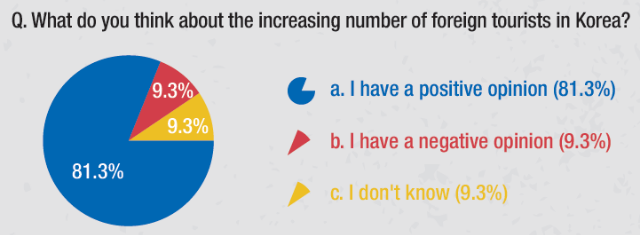
We looked at the positive effects and problems of the increasing number of foreign
tourists. Then, what is the awareness about this issue of Kyonggi University students?
Based on the results of a survey about this issue targeting 78 Kyonggi University students
in March, about 81.3% of students answered, “I have a positive opinion,” about 9.3% of students answered, “I have a negative opinion” and the remaining students answered, "I don't know." Most students said that they had a positive opinion about the increase, and the reason given was that "It seems that growing the tourism industry will develop the nation's economy." The reasons for the students who answered negatively were more various.
Student A : I hope we will not feel uncomfortable when foreign tourists visit our country. However, when I go to a shopping or tourist spot, there are many events for foreigners. I am not sure whether it is a foreign country or Korea. For example, there are many more billboards in foreign languages than in Korean in Myeong-dong.
Student B : I heard that foreign countries have higher rates of crime than our country. I think it is dangerous because foreigners can commit crimes.
Student C : I think that foreign tourists are causing problems such as the destruction of our heritage and making a lot of noise.
Thus far, we have looked at the attitudes about foreign tourists of Kyonggi University students. Although the positive view is prevalent among students, it is becoming a social problem that foreign tourists have suffered a lot of discrimination and inconvenience in Korea. The number of complaints report by foreigners to the Korea Tourism Organization in Korea was 829 in 2015. This shows that many foreigners have experienced inconveniences on their trips. The complaints targeted shopping malls (26.5%), accommodatious (14.0%), taxis (12.2%), travel agencies (8.5%), and airports (8.5%). The most common reasons given were unkindness, unfair prices in relation to shopping and unfair charges such as taxis that did not use their meters. In addition, the complaints concerned the poor service of travel
agencies optional items and shopping practices. These inconveniences are not ones faced by Korean people, but foreigners are discriminated against just because they are foreigners. These are probably the reasons why foreigners will not be returning to Korea.
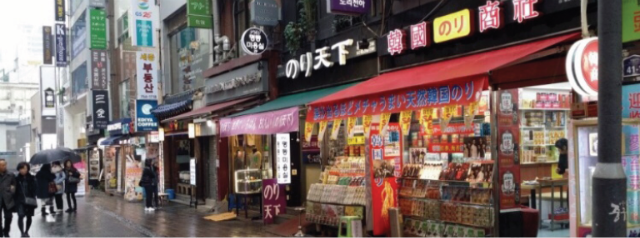
Then, is there any Kyonggi University foreign student who has felt discrimination in Korea? Three foreign students who are studying at Kyonggi University answered that they had felt discriminated against.
Student D (from Vietnam) : I came to Korea to study, but I needed to find a job because I have to earn money. I experienced a lot of discrimination when looking for a job and when I was working. It was hard for me because it was also difficult for me to adapt myself to Korean life.
Student E (from Cameroon) : The boss didn't know much about me or my story but just the reason that I was a foreigner was enough to reject me, and this is what happens to me most of the time.
Student F (from Spain) : One day, I went to the theater with my girlfriend. A man who was passing by us swore at my girlfriend and said because my girlfriend wore something sexy she was a prostitute. We felt very angry, but we ignored the incident because we thought he was loser.
If the foreign students had been of Korean, ethnicity, it is unlikely they would have experienced discrimination in Korea. However, many foreigners will be identified as such by their appearance. As the foreign students who contributed to this article, suffered discrimination even when they were looking for a job or on a date in Korea, it can be assumed that foreigners will have difficulty when sightseeing or living in our country. As the number of foreign tourists and foreigners living in our country increases, our consciousness also needs to be improved.
Then, are not Koreans undergoing discrimination in foreign countries? This time, let's look at the discrimination that Korean people have experienced in foreign countries. As a result of the survey, we found that it was believed that more Koreans were discriminated against in foreign countries than tourists who came to Korea traveled were discriminated against in Korea. The most serious problem is discrimination based on the anti-Korean sentiment in Japan. An example of this is the "horseradish terrorism" that occurred around a sushi restaurant in Osaka, a typical sightseeing spot in Japan. The sushi restaurant "Ichiba Sushi," located in the center of Osaka City, provided more horseradish with sushi when a foreigner who seemed to be a Korean came in. Since the incident was reported in a newspaper, criticism of "hashish terrorism" has surfaced on the Internet in Japan. Some customers have also criticized it as "nonsense spread by customers who do not speak Japanese".
This was not the only case of discrimination against Koreans in foreign countries. In fact, Australia is a country with one of the highest rates of racial discrimination, and one which Koreans choose the most for working holidays. One in two South Korean living in Australia, including student visa and working holiday visa holders, said they had experienced discrimination based on the color of their skin during the past year. This supports the fact that racial discrimination in Australia is true.
Then, let's look at what kind of discrimination Kyonggi University students felt when they went abroad. The most frequent answer in the survey conducted with students was that they ignored tourists because they could not speak the local language. Second, in western countries like those in Europe, some students were prohibited from entering shops only because they were Asian. Also, it was revealed that they experienced various type of discrimination such as when the bus doesn’t stop after a student presses the stop button. Such discrimination against foreign tourists may lead to racial discrimination. In March last year, we surveyed 78 students of Kyonggi University about whether they had been discriminated against in a foreign country. According to the results, 22.7% of the students had been discriminated against.
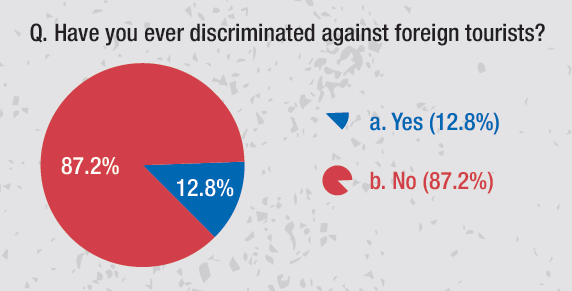
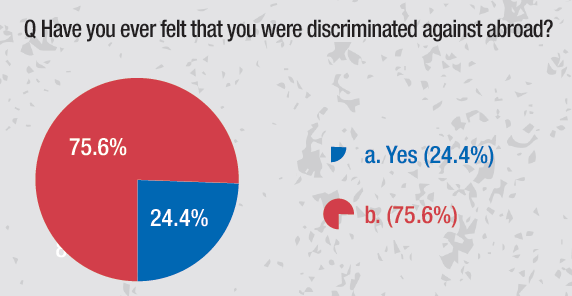
So what is the reason for this discrimination? From now on, let me introduce the causes and solutions to these problems. First, racial discrimination is based on the belief that the physical characteristics of a group are more prevalent or less prevalent among members of that group, and psychological characteristics are linked in the same way. It is often used to refer to negative emotions aimed at racial or ethnic groups. Race generally refers to physical characteristics such as color, skeletal structure and cultural or ethnic characteristics. Negative attitudes that represent racism are called prejudice, and racially or ethnically targeted behavior caused by prejudice is called discrimination.
To look at the causes of racial discrimination, we must first go into American history. America is a representative country of democracy, but slavery existed those for 150 years. In the 1800s, as the cotton business was developing in the south of the United States, farmers began to take slaves from Africa through slave traders. Slave traders treated African blacks as if they were animals, and most white people thought black people were barbaric. They did not feel guilty because they thought it was natural for them to buy slaves from slave merchants. The child of a slave was, of course, a slave, and a child born between a white man and a black woman slave became a slave along with his or her mother. Through the efforts of various equality movements slavery is now illegal in the United States. However, racial discrimination based on this history has continued to this day and has been extended to foreign tourists as well as foreign immigrants. Though
racial discrimination and discrimination against foreign tourists in South Korea cannot be attributed to racial discrimination originating in the United States, by looking back on this history we can think about whether or not we are discriminating, racially.
If so, how should we treat foreign tourists in the future and what kind of attitude should we have when traveling abroad as a Korean? An answer can be found in one case in England. In England in 2012, a man accused of racially harassing a black athlete was ordered to pay a fine of £20,000. In addition, the man was banned from entering a football field for three years, so he could not go to any football field in England or Wales, including Old Trafford. The man, according to the ruling, had to return his passport to the authorities when an English national team game was held abroad. Jim Riggett, a British police officer in the UK, said that "It will be a shocking lesson for a few fans who believe that they can attack players just because their skin color is different." This response to racism helps to prevent such a thing from happening again by administering severe penalties for those who defame black people using their the freedom of expression. It also allows us to wonder whether the same foreigner gave a colder gaze to other black or Southeast Asian people than white people.
So far, we have examined the problems of foreign tourists visiting Korea and the problems and inconveniences of Korean tourists visiting foreign countries. When we use the word “tourists”, we are referring to people who wish to see and hear more about the world. However, it seems necessary for our society to think about how many negative problems arise from such a positive word. Bad behaviors arising from simply taking care of our own interests are increasingly discriminatory, and broadly, this can lead to racial discrimination. In fact, in order to solve these problems, Korea also prepared measures for raising tourism kindness in 2015. For example, it became mandatory to display the prices of items to eliminate inflated rates, a three-strike system for transportation services that overcharge was introduced, food maps for foreigners were made, and sanctions to reduce lodging
and food complaints were prepared. Despite these measures, complaints from foreign
tourists are increasing in Korea.
In order to solve this problem, it is necessary to improve our basic awareness of foreigners on a personal level and to make certain improvements on the national level. Over time, as globalization accelerates, it is becoming a channel for developing diverse cultures around the world. To obtain positive results from globalization, it is necessary to introduce cultures of different countries without discrimination and to recognize characteristics of each culture with an open mind.
Now that you have read this article, how about saying a friendly word to the foreign
friends you can meet at Kyonggi University as well as to foreign tourists. We want our consciousnessses to change as quickly as our rapidly developing culture.
기획부장 이희원
수습기자 김은송
 Freedom Given to Youth: An Opportunity for Choice or a Burden of Constraint?
“Are we truly free today?” Classical literature is far more than time-honored stories. It offers profound insights into human nature and society that transcend time, remaining a valuable resource for examining the challenges our world faces today. This article will draw on George Orwell’s 1984 and Charles Dickens’ Oliver Twist to explore the contemporary issues of youth housing and the emergence of a surveillance society ...
Freedom Given to Youth: An Opportunity for Choice or a Burden of Constraint?
“Are we truly free today?” Classical literature is far more than time-honored stories. It offers profound insights into human nature and society that transcend time, remaining a valuable resource for examining the challenges our world faces today. This article will draw on George Orwell’s 1984 and Charles Dickens’ Oliver Twist to explore the contemporary issues of youth housing and the emergence of a surveillance society ...

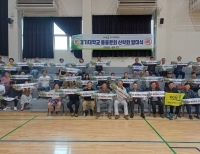 [단신] 산악회, 본교 동문의 버팀목이 될 수 있도록
[단신] 산악회, 본교 동문의 버팀목이 될 수 있도록
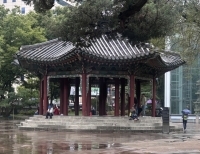 [사회메인] 노인 인구 1,000만 시대, 준비 없는 사회가 불안해
[사회메인] 노인 인구 1,000만 시대, 준비 없는 사회가 불안해
 [네컷만화] 라벨링 문화
[네컷만화] 라벨링 문화
 [진리터] 결국 우리 모두 돌아볼 것이니
[진리터] 결국 우리 모두 돌아볼 것이니

 목록
목록















